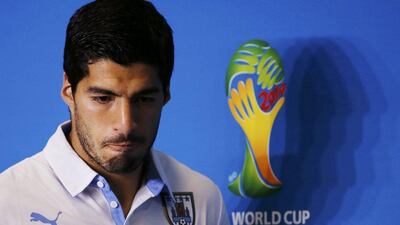Luis Suarez's family and friends described the Uruguay star as a "great guy" troubled by explosive rage as he began a four-month ban from football Thursday for biting an opponent.
Suarez, the fourth of seven brothers, was always "calenton" – a hothead in Uruguay – his paternal grandmother, Lila Piriz, told AFP from his hometown, the northwestern city of Salto.
The 27-year-old striker himself says his combustible personality made him "the player I am today" – one of the best forwards in the world, by many estimations.
But it has also gotten the Liverpool star into plenty of trouble.
Click here to visit The National's World Cup 2014 landing page
He served an eight-match ban for racially abusing Manchester United's Patrice Evra in 2011, was suspended twice for biting in 2010 and 2013, and was handed a nine-match suspension Thursday for biting Italy's Giorgio Chiellini.
"I don't know what's going on with [him]" Piriz said.
"I don't know why he has these explosive outbursts. He can't control them, even though he has everything he needs to be happy. Maybe it's his parents' divorce, the hardships they went through," she said.
Piriz, who still lives in a modest home in Salto despite her grandson's celebrity, said Suarez inherited his personality from his father, a soldier who was himself a local footballer.
"We never thought Luisito was going to be the most famous of the bunch with that personality of his," she said.
Roberto Mezza, a family friend who played with Suarez's father at Salto club Deportivo Artigas, agreed the apple didn't fall far from the tree.
"Knowing his father...," he said with a laugh.
Richard Suarez, who has no relation to Luis' family but watched him play youth football growing up in Salto, said the striker "was never aggressive."
"A lot of people have written him off as a bad person but it's not like that. He's a great guy," he said.
Work was hard to come by in Salto, and when Suarez's mother got a job as a cleaner in Montevideo, the whole family moved to the Uruguayan capital.
Suarez, then seven years old, had trouble adapting, according to journalist Ana Laura Lissardy's book "Vamos que vamos," a collection of interviews with the Uruguay national team.
Two years later his parents separated, "shaking the ground beneath his feet," Lissardy wrote.
That was followed by a rebellious adolescence when Suarez showed little interest in either school or football.
Sports psychologist Pablo Martinez of Uruguay's University of the Republic said biting others generally "appears in people who have had a very aggressive, very poor childhood."
Like many Latin American footballers, Suarez went from a life of poverty to stardom and riches almost overnight.
"He has been treated by a psychologist for anger management and I thought he had it under control," Martinez told AFP.
Suarez's life was transformed at age 14 when he met the girl who would become his wife, Sofia Balbi, one of his main inspirations to pursue professional football.
She became a guiding force that helped control "both my life and my head," he told ESPN Brazil last November.
But the sweethearts were forced apart when Balbi moved to Barcelona with her parents.
Suarez decided the only way to get her back in his life was to become a professional footballer.
No sooner had he signed his first European contract with Dutch club Groningen in 2006 than he asked Balbi's parents to let their then-16-year-old daughter move with him to the Netherlands.
Suarez told AFP in a March 2013 interview that his personality was at the heart of his success.
"You can lose some things, but can never lose the slyness, the passion that you have had since you were a kid playing in the street," he said.
"If I didn't have the character that I have today on the pitch, I don't think that I would have become the player that I am."
Follow us on Twitter @SprtNationalUAE

Family worried, confused by Luis Suarez’s ‘explosive outbursts’
Family and friends expressed their concern for the 'calenton' - hothead - after his Fifa ban on Thursday stemming from yet another biting incident.
Most popular today
